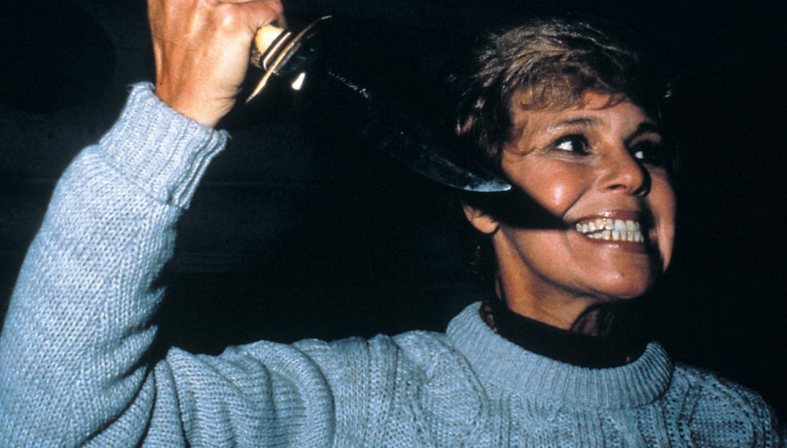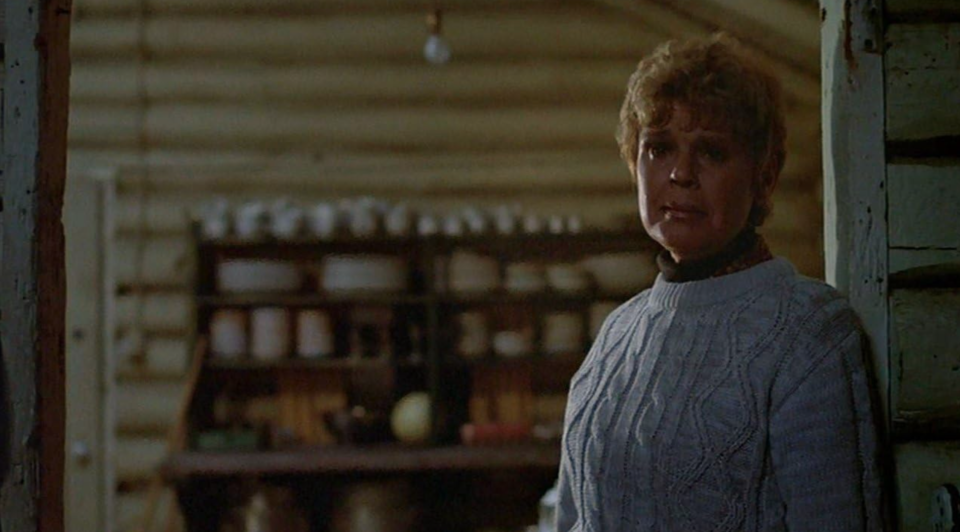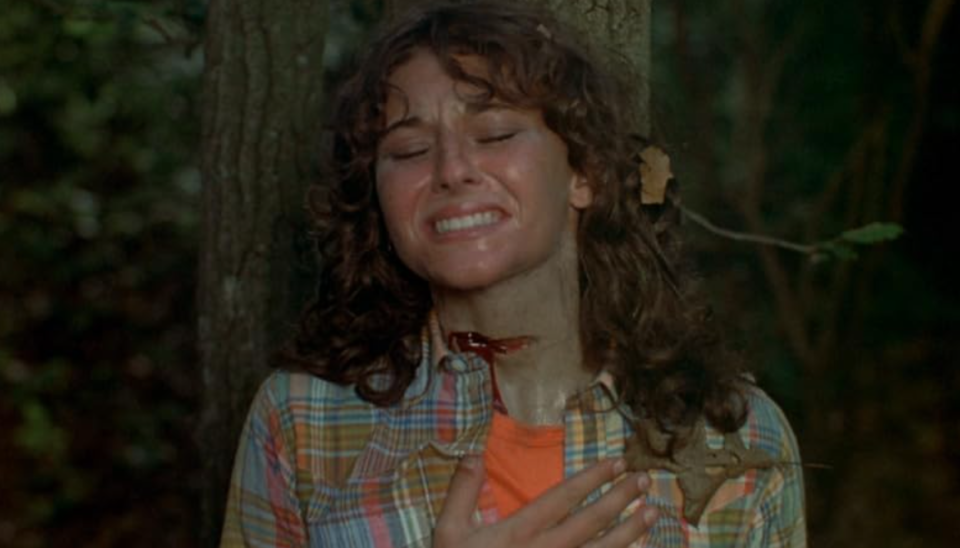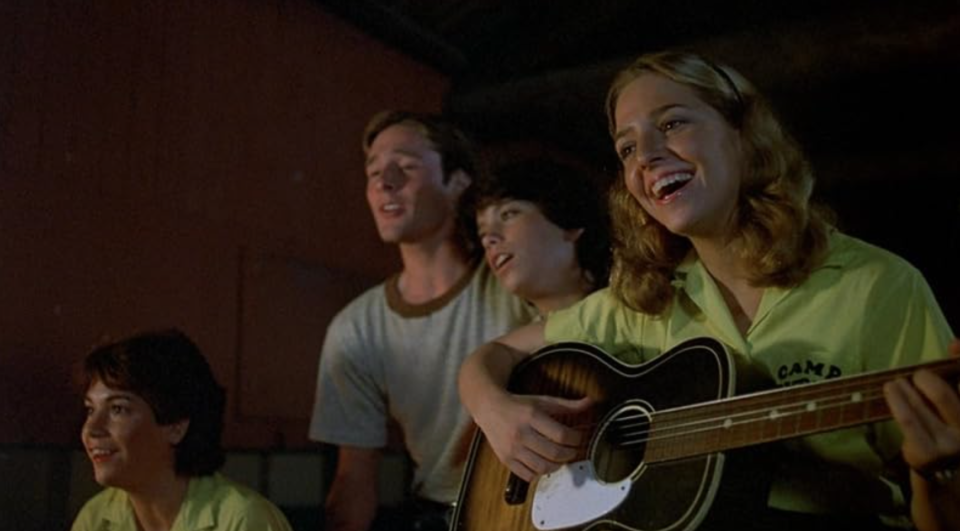Mrs. Voorhees: Killer Force of Mother Nature [Fatal Femmes]

It’s difficult to overestimate the impact Jason Voorhees has had on modern culture. The hulking killer from the Friday the 13th films has become a household name among horror fans and general audiences alike. His red-tinged hockey mask has come to symbolize horror films of the late 20th century along with Freddy’s tattered hat and Michael’s long kitchen knife. What many casual fans—including Casey Becker (Drew Barrymore) in the 1996 slasher Scream—don’t know is that Jason Voorhees is not the franchise’s first killer.
The original 1980 film features a murderous matron who blows through the staff of Camp Crystal Lake like a thunderstorm that rages across the rustic grounds. Final girl Alice (Adrienne King), after finding her fellow counselors murdered, runs out into the pouring rain and bumps into a friendly woman approaching the camp. Unfortunately, Pamela Voorhees (Betsy Palmer) is not there to save the day and her crimes set the tone for the slasher crave that would revolutionize the horror genre. With nature seeming to work as her accomplice, Mrs. Voorhees embodies the brutality of a mother bear determined to punish those who would endanger the life of her beloved son.
HER STORY
We first meet Mrs. Voorhees in the film’s final act, but her presence can be felt from the opening scene. While a group of camp counselors sings around a campfire, Barry (Willie Adams) and Claudette (Debra S. Hayes) sneak off to have sex in the supply loft, but are surprised when an unseen killer approaches from the shadows. The scene is framed from the killer’s point of view and the doomed lovers address the camera when pleading for mercy.
In the present-day timeline, another death plays out in a similar, though decidedly more gruesome fashion. While hitchhiking to her job at Camp Crystal Lake, Annie (Robbi Morgan) takes a ride with an unseen driver who speeds past the camp’s entrance then chases the frightened girl through the woods and slits her throat. Again, we see the world through her point of view, providing the unsettling feeling that we are somehow a part of these murders.
Next, Mrs. Voorhees begins stalking the counselors already working at camp. Using the storm as cover, she watches them from the woods before choosing her moment to strike. When we finally meet this ruthless killer, we have no reason to suspect she may be dangerous. Played by veteran actress Betsy Palmer, she appears to be a friendly face in the midst of murderous chaos. Alice has just found her friends murdered and is thrilled to see an authority figure appear at camp. However, Mrs. Voorhees is far from the polite friend she claims to be. As Alice tries in vain to convince the older woman to drive her to safety, Mrs. Voorhees begins to tell the horrific story of her son’s death. Alice soon realizes that she is in the clutches of the killer and begins a deadly cat-and-mouse game throughout the camp.

HER MOTIVE
Mrs. Voorhees doesn’t feel like much of a threat until the moment she strikes. When Barry and Claudette notice her, they’re afraid that they’ll be fired for fornication. But they have no reason to believe their lives are in danger. Annie gets into her car with no hesitation, believing the still unseen killer to be a kind and trustworthy stranger. When we finally meet Mrs. Voorhees, this presumption of authority becomes clear.
She was once an employee of Camp Crystal Lake. “A friend of the Christys” who own the campgrounds, she worked as a cook during the summers of 1957-58 when the first horrific deaths took place. Twelve years later, she is an unassuming older woman with sensible short hair and a gray cable-knit sweater. Far from the masked monster who will later dominate the franchise, Mrs. Voorhees appears no more dangerous than anyone we’ve met in the film so far.
Unfortunately, the extent of her madness soon becomes clear. Not only was Mrs. Voorhees an employee of the camp, but her son Jason was a camper. Later franchise entries will extrapolate on his own persona, but Mrs. Voorhees simply describes him as a delicate boy and a poor swimmer. He was the child who drowned in 1957, a tragedy first mentioned by a truck driver from town.
Mrs. Voorhees gives us more context, insisting that the counselors were supposed to be watching him, but were, “making love” while her son was screaming for help. Driven mad with grief, Mrs. Voorhees now blames all counselors for the death of her son. The film’s iconic “ki ki ki ma ma ma” is a reduction of a command she imagines coming from her deceased child. In an eerie approximation of Jason’s childlike voice, she repeats, “Kill her, mommy,” and channels an uncontrollable urge to murder anyone who reminds her of the teens she believes killed her son.
Though deranged, Mrs. Voorhees’s motive makes a sick kind of logical sense. She brought her precious son to a camp she believed to be safe and left him in the care of young adults who promised to watch over him. It’s likely that the guilt of outsourcing her parental role and trusting her son’s life to these counselors has caused her to lose touch with reality. She now views every counselor she sees as a threat. Jason’s death was an accident, but it plays into the worst fears of every parent who sends their kids to summer camp. For many families, this is the first time their children have stayed outside the home, a necessary but terrifying step towards independence. The counselors who swore to protect Mrs. Voorhees’s own child have failed her in the most egregious way possible, and it has driven her to kill.
As she tells Alice her awful story, Mrs. Voorhees expresses shock that Steve Christy (Peter Brouwer) would try to open the camp again. We learn that she’s similarly tried to prevent a reopening in the past by lighting fires and poisoning the water supply. She likely believes these crimes are needed to protect any children who may be placed in the care of irresponsible counselors and to prevent their parents from experiencing the same devastating loss. Through murder, she’s ridding the world of irresponsible teens who would choose their own pleasure over the safety of children and saving future generations from the negligence that killed her own son.

HER WEAPONS
Lurking in the shadows, we don’t see many of the weapons Mrs. Voorhees uses to kill. Intimate POV shots and offscreen deaths prevent us from seeing the details of several murders. She kills Annie with a hunting knife she seems to be carrying on her person. We can assume that she slits Ned’s (Mark Nelson) throat with this knife as well, but the bodies of Steve, Bill (Harry Crosby), and Brenda (Laurie Bartram) are posed with objects found on the campgrounds. She kills Jack (Kevin Bacon) with an arrow presumably stolen from the archery range then murders Marcie (Jeannine Taylor) with the ax Steve used to chop wood. When chasing Alice through the camp, she brandishes the machete Bill had been using to clear brush.
Mrs. Voorhees chases Alice through camp using anything she can find as a weapon. She eventually resorts to using her hands, slapping the young woman and throwing her around the camp. When Alice gets the upper hand, she escapes to the beach and takes a moment to collect herself. Unfortunately, Mrs. Voorhees returns and the fight continues, this time to the death. Alice decapitates the older woman with the machete, a weapon that would go on to become the franchise’s signature blade.
Rather than an iconic weapon, Mrs. Voorhees uses elements from the camp itself to enact her deadly plans. It’s possible she’s planned this as some sort of ironic punishment. But the more likely explanation is that she is simply killing with weapons she happens to have at hand. Like the thundering storm, this rage-filled mother has turned the camp into a place of death for the campers. She believes this is a fitting punishment for the death they dealt to her son. Residents of the neighboring town call the area Camp Blood and Crazy Ralph (Walt Gorney) declares that “It has a death curse.” While true in theory, the real curse of Camp Crystal Lake is the wrath of a grieving mother who has unleashed a deadly plague on anyone choosing to stay on the grounds.

HER VICTIMS
Mrs. Voorhees targets the young adults hired as counselors as well as anyone in a position of authority at Camp Crystal Lake. Though they are charged with caring for children, many of these counselors are little more than children themselves. Steve’s employees spend nearly as much time having fun as they do working. Like campers, these young adults are also facing a new kind of responsibility and serving as surrogate parents for the children of strangers.
We don’t find out what happened to the original counselors whose negligence caused Jason’s death. None of the film’s characters have any connection to the 1957 tragedy other than working at the camp where it happened. We also never see any counselors failing to care for children. The opening scene shows that all the campers are safely asleep in their cabins while the teen staff sits around a fire. Though technically responsible for kids, Barry and Claudette do not put any children in danger when they sneak off to have sex.
Steve’s new batch of counselors never gets the chance to prove their trustworthiness. They die before campers arrive, some on their very first day on the job. Hard at work to prepare the facilities, they only relax when the work is done. They may goof off at times, but most prove to be quite responsible. When Ned calls for help, they jump into action and work together to pull him from the lake. He may be pretending to drown, but they are deadly serious about saving him. While lying in bed later that night, Brenda is lured out into a raging storm by a childlike voice calling for help. She walks out into the stormy night in her nightgown, determined to save the child she believes is crying out for help.
Had these counselors ever gotten the chance to care for children, they would probably do their jobs well. However, Mrs. Voorhees does not see them as individuals. She only sees the counselors who were supposed to be watching her son. When explaining herself to Alice, she seems to lose track of who it is she’s talking to and begins accusing the confused young woman of neglecting her duties. It doesn’t matter what these kids do. In Mrs. Voorhees’s eyes, they are irresponsible and must be punished. The film’s final girl, Alice, fights back and decapitates Mrs. Voorhees on the shore of the lake. By surviving, she speaks for all of her fallen friends and insists that she is more than just an irresponsible counselor. Alice and the counselors of Camp Crystal Lake are a complex group of young adults, not the monolithic delinquents Mrs. Voorhees would have us believe.

HER LEGACY
Unlike many slasher villains, Mrs. Voorhees does not return in a later installment. She does not rise from the dead nor does she gain strength through mystical means. The film concludes with the water-logged corpse of her son bursting out of the water to attack Alice while she’s dozing in the canoe. Jason then becomes the star of a franchise that would go on to produce another eleven installments.
Mrs. Voorhees may not return to the screen, but her presence can be felt throughout the franchise. Friday the 13th Part 2 follows an adult Jason (retconned into existence) living in a crumbling shack that contains a crude altar. Her head and sweater sit in a position of honor, posed to remind Jason of his beloved mother. He will now kill for her like she once killed for him. Recognizing her power, occasional final girls will invoke her memory in an attempt to quell Jason’s murderous rage.
Mrs. Voorhees is not the first cinematic female killer, and she’s certainly not the last. However, this brutally driven mother did kick-start the events of a franchise that would change the landscape of horror. Though pivotal, the Friday the 13th series is a slasher anomaly in that it does not follow a central final girl. Alice dies in the opening scene of the second chapter and most other heroines appear in a single installment. Mrs. Voorhees remains the lone female legacy in one of the greatest and most enduring horror stories of all time. The mother of a killer and a killer herself, her iconic phrase of revenge, “ki ki ki ma ma ma” can still be heard echoing through the halls of horror.
Categorized:News

